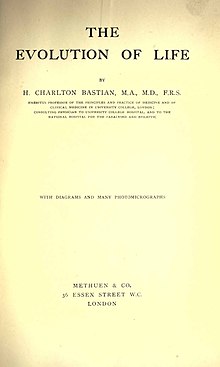Henry Charlton Bastian

Henry Charlton Bastian (26 April 1837 in Truro, Cornwall, England – 17 November 1915 in Chesham Bois, Buckinghamshire) was an English physiologist and neurologist.
Biography
Bastian was born at Truro, Cornwall and graduated from University of London in 1861.[1] He obtained his M.D. in 1866. He was elected a Fellow of the Royal Society in 1868 and a Fellow of the Royal College of Physicians in 1870.[1]
In 1867, Bastian was elected Professor of Pathology and Assistant Physician at UCL Medical School and successively became Professor of Clinical Medicine at UCL Medical School.[1] In 1868, he became assistant physician to the National Hospital for the Paralysed and Epileptic, then full physician in 1887. He served at the National Hospital until he retired in 1912.[1]
He was an advocate of the doctrine of archebiosis.[1] He believed he witnessed the spontaneous generation of living organisms out of non living matter under his microscope and therefore argued against the concept of germ theory. He promoted a theory of "heterogenesis", a process by which existing living beings give birth to wholly different forms.[2][3] Bastian's criticism of the germ theory of disease has been linked to the theory's initially slow impact in the UK.[4] The term biogenesis was coined by Henry Bastian.
Works

- Monograph of the Anguillulidae (1865)
- The Modes of Origin of Lowest Organisms (1871)
- The Beginnings of Life: Being Some Account of the Nature, Modes of Origin and Transformation of Lower Organisms, I–II (1872)
- Evolution and the Origin of Life (1874)
- The Brain as an Organ of Mind (1880)
- The "muscular sense" its nature and cortical localisation (1887) [5]
- A Treatise on Aphasia and Other Speech Defects (1898)
- Studies in Heterogenesis (1903)
- The Nature and Origin of Living Matter (1905)
- The Evolution of Life (1907)
- The Origin of Life (1911)
See also
- Bastian-Bruns law or Bastian-Bruns sign
- Receptive aphasia
References
- ^ a b c d e Pearce, J. M. S. (2010). Henry Charlton Bastian (1837–1915): Neglected Neurologist and Scientist. European Neurology 63: 73-78.
- ^ "Reviews and Notices of Books". The Lancet. 2: 563. 1872.
- ^ J. A. T. (1904). "Studies in Heterogenesis". Nature. 69 (1791): 385–387. Bibcode:1904Natur..69..385J. doi:10.1038/069385a0. S2CID 44812522.
- ^ Thorne, Sally; Stark, Hillary (2016). Leonard, Angela (ed.). Medicine through time, c1250-present. Pearson Education Limited. pp. 70–71. ISBN 978-1-292-12737-8.
- ^ Bastian, Henry Charlton (1887). "The "muscular sense" its nature and cortical localisation". Brain. 10 (1): 1–89. doi:10.1093/brain/10.1.1.

Henry Charlton Bastian
Further reading
- Strick, James. (1999). Darwinism and the Origin of Life: The Role of H. C. Bastian in the British Spontaneous Generation Debates, 1868-1873. Journal of the History of Biology 32 (1): 51-92.
- ^ International Plant Names Index. Bastian.













